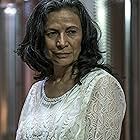Salomé, who was abandoned as a child by her mother, is a cabaret dancer who works at the cabaret Salón D'Rubí.Salomé, who was abandoned as a child by her mother, is a cabaret dancer who works at the cabaret Salón D'Rubí.Salomé, who was abandoned as a child by her mother, is a cabaret dancer who works at the cabaret Salón D'Rubí.
- Awards
- 2 wins & 6 nominations total
Browse episodes
Storyline
Did you know
- ConnectionsRemake of La colorina (1977)
- SoundtracksSi No Te Hubieras Ido
Written and Performed by Marco Antonio Solís
Featured review
A very gutsy story, challenging the audience to embrace a heroine who is (initially at least) uneducated, somewhat vulgar, and clearly out of her element in the upscale hero's environment. Edith Gonzales, whom I have seen before in CORAZON SALVAJE and EN CARNE PROPRIA, is in top form and clearly deserves next year's Best Actress (Protagonist) award for this performance.
Salome starts out as an abandoned child forced to survive in a world where women alone are regarded as suspect and are easily victimized. She is currently dealing with the consequences of bad choices she has made in the past and ones that aren't such a good idea now. She's not all that easy to like in her early episodes, but after a while you realize that she has been a victim and is now clearly determined not to be one for the rest of her life.
Julio, the hero of this tale, is given more on his plate than usual in the sense that we are asked to accept that he really believes that he loves both Angela and Salome. I think it's easier to accept him because of his harpy of a mother and how she must be affecting his view of women in general.
Maria Rubio is the perfect mother from hell. I am waiting to find out whether her machinations will make Salome into another Stella Dallas or Madame X, considering that the main part of the story is taking place in 1980.
The amount of bare flesh exposed in this series seems to be pushing the envelope a little for Mexican television, and does so appropriately. Niurka Marcos and the older actress who plays Yolanda should be noted for their courage to do this.
There's a lot of good music in this series as well. Its current time slot is appropriate; this one is not for kids.
Salome starts out as an abandoned child forced to survive in a world where women alone are regarded as suspect and are easily victimized. She is currently dealing with the consequences of bad choices she has made in the past and ones that aren't such a good idea now. She's not all that easy to like in her early episodes, but after a while you realize that she has been a victim and is now clearly determined not to be one for the rest of her life.
Julio, the hero of this tale, is given more on his plate than usual in the sense that we are asked to accept that he really believes that he loves both Angela and Salome. I think it's easier to accept him because of his harpy of a mother and how she must be affecting his view of women in general.
Maria Rubio is the perfect mother from hell. I am waiting to find out whether her machinations will make Salome into another Stella Dallas or Madame X, considering that the main part of the story is taking place in 1980.
The amount of bare flesh exposed in this series seems to be pushing the envelope a little for Mexican television, and does so appropriately. Niurka Marcos and the older actress who plays Yolanda should be noted for their courage to do this.
There's a lot of good music in this series as well. Its current time slot is appropriate; this one is not for kids.
- How many seasons does Salomé have?Powered by Alexa
Details
- Runtime45 minutes
- Color
Contribute to this page
Suggest an edit or add missing content




























